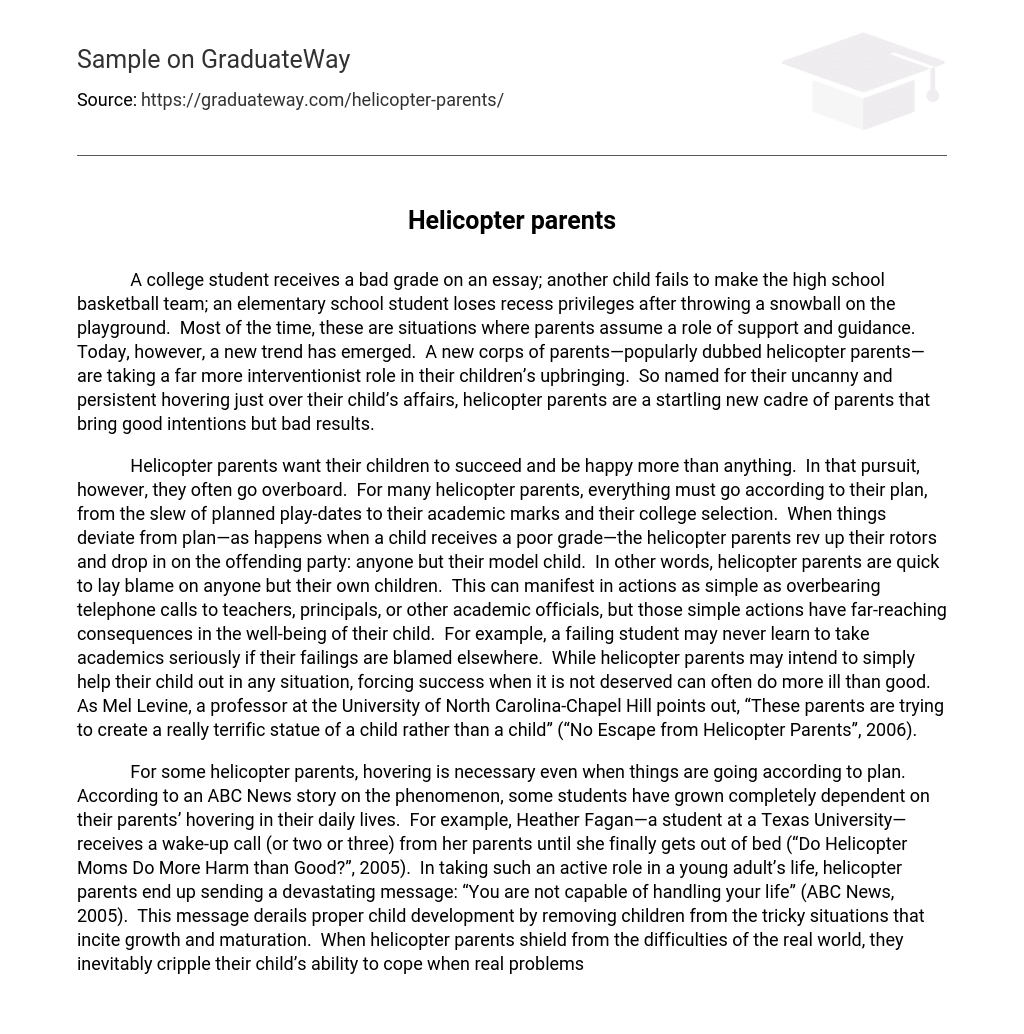A college student receives a bad grade on an essay; another child fails to make the high school basketball team; an elementary school student loses recess privileges after throwing a snowball on the playground. Most of the time, these are situations where parents assume a role of support and guidance. Today, however, a new trend has emerged. A new corps of parents—popularly dubbed helicopter parents—are taking a far more interventionist role in their children’s upbringing. So named for their uncanny and persistent hovering just over their child’s affairs, helicopter parents are a startling new cadre of parents that bring good intentions but bad results.
Helicopter parents want their children to succeed and be happy more than anything. In that pursuit, however, they often go overboard. For many helicopter parents, everything must go according to their plan, from the slew of planned play-dates to their academic marks and their college selection. When things deviate from plan—as happens when a child receives a poor grade—the helicopter parents rev up their rotors and drop in on the offending party: anyone but their model child. In other words, helicopter parents are quick to lay blame on anyone but their own children. This can manifest in actions as simple as overbearing telephone calls to teachers, principals, or other academic officials, but those simple actions have far-reaching consequences in the well-being of their child. For example, a failing student may never learn to take academics seriously if their failings are blamed elsewhere. While helicopter parents may intend to simply help their child out in any situation, forcing success when it is not deserved can often do more ill than good. As Mel Levine, a professor at the University of North Carolina-Chapel Hill points out, “These parents are trying to create a really terrific statue of a child rather than a child” (“No Escape from Helicopter Parents”, 2006).
For some helicopter parents, hovering is necessary even when things are going according to plan. According to an ABC News story on the phenomenon, some students have grown completely dependent on their parents’ hovering in their daily lives. For example, Heather Fagan—a student at a Texas University—receives a wake-up call (or two or three) from her parents until she finally gets out of bed (“Do Helicopter Moms Do More Harm than Good?”, 2005). In taking such an active role in a young adult’s life, helicopter parents end up sending a devastating message: “You are not capable of handling your life” (ABC News, 2005). This message derails proper child development by removing children from the tricky situations that incite growth and maturation. When helicopter parents shield from the difficulties of the real world, they inevitably cripple their child’s ability to cope when real problems arise further down the road of life.
Some parents take these excesses so far that they have prompted the development of a new category of helicopter parents: black hawk parents, a reference to the military helicopters that go to any length to get the mission accomplished. In several extreme cases of black hawk parents, fathers and mothers have actually attempted to impersonate their children in order to take exams in their place and other such absurdities. Indeed, one mother—and former cheerleader—even attempted to audition for the high school cheerleading squad in her daughter’s place to enhance her chances (The London Times, 2009). That is not good parenting; it’s ridiculous.
The difficult part of this problem is that helicopter parenting can often be welcomed by children, and even encouraged. Students want to see their teacher yelled at for giving them a bad grade, and they are all too eager to see blame shifted when it really is their fault for not turning that paper in on time. For parents and children alike, the easy way is often not the right way. If children are allowed to learn the lessons of life first-hand, they will be well-equipped to take on later challenges; if not, they will never have a chance to test out their rotors on their own.
Works Cited:
“Do Helicopter Moms Do More Harm Than Good?” ABC News. 21 October 2005. Available
online from: http://abcnews.go.com/2020/Health/story?id=1237868.
“No Escape from Helicopter Parents.” The Seattle Post-Intelligencer. 27 January 2006.
Available from: http://seattlepi.nwsource.com/lifestyle/209473_copterparents.html.
“The Mad Excesses of Helicopter Parents.” The London Times. 15 January 2009. Available
online from:
http://www.timesonline.co.uk/tol/comment/columnists/guest_contributors/article5519108.ece





